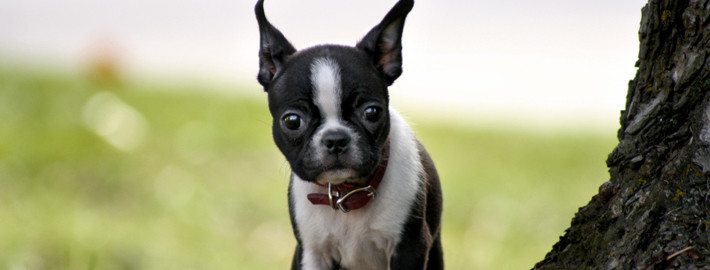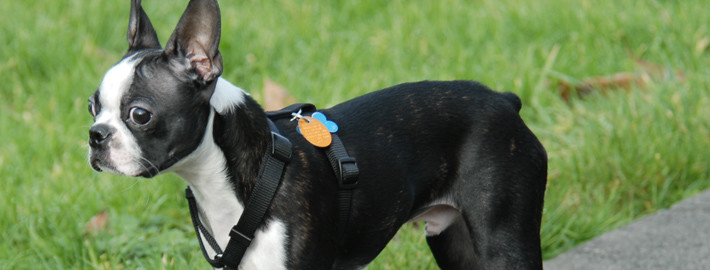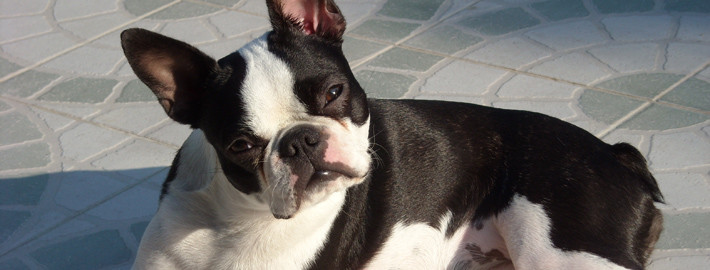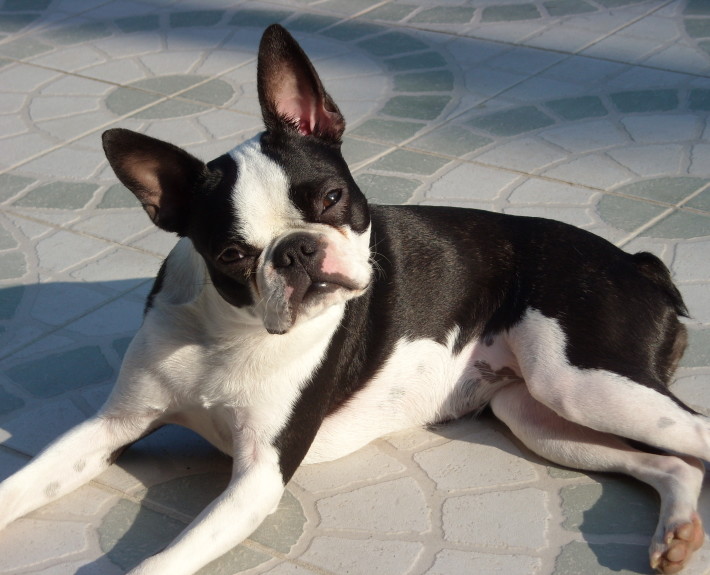What makes the Boston Terrier Unique?
Among the most instantly recognizable dog breeds, the Boston Terrier makes a great pet for apartment and city dwellers alike. These friendly creatures do not need a lot of exercise and they gets along well with a wide variety of people and animals. Needless to say, these small to medium sized dogs make wonderful companions for anyone seeking a new pet
Breed Groups
Page Contents
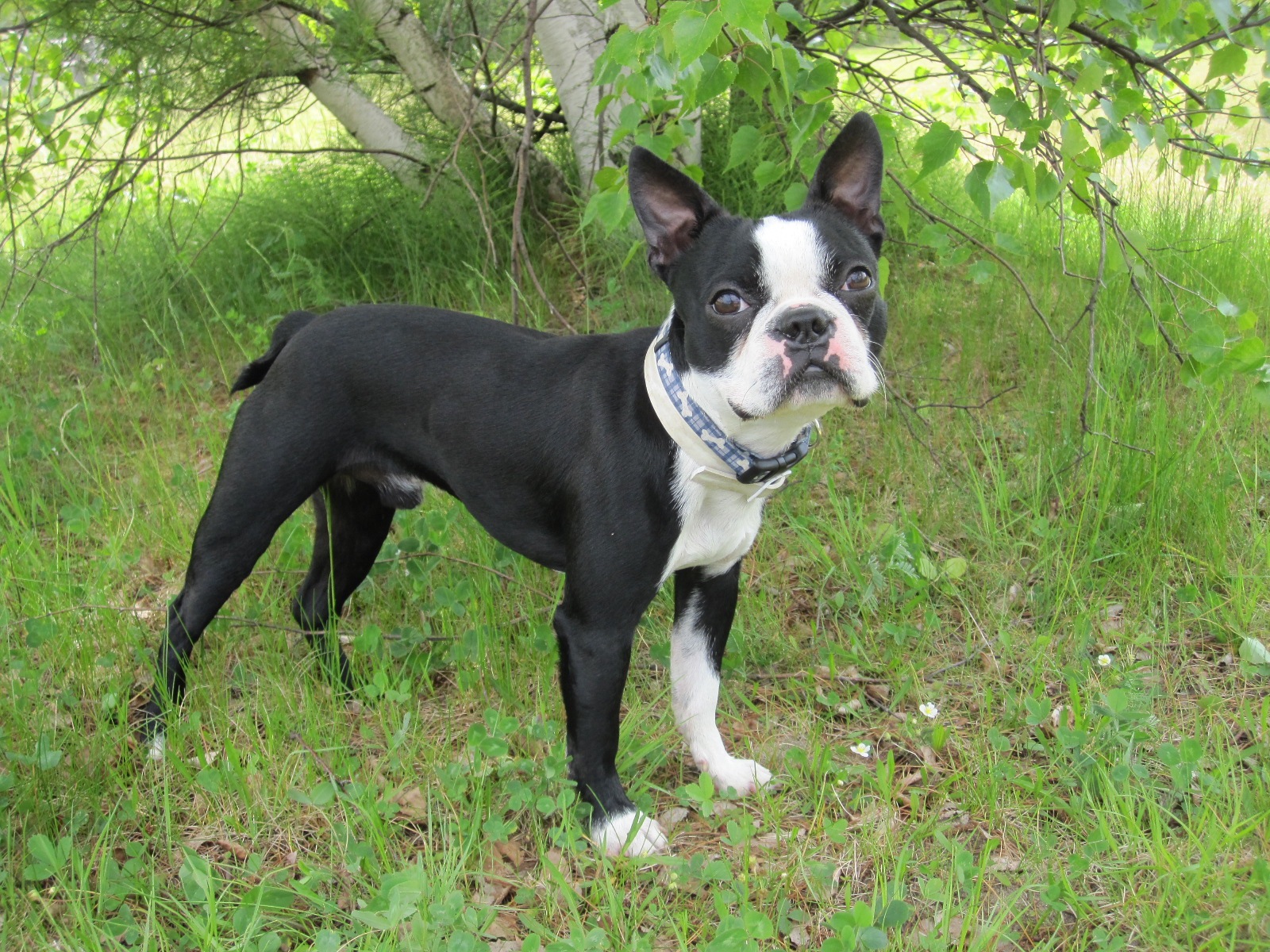
SnapShot
| Size: | Males – 38.1 to 43 cm (15 to 17 inches) Females – 38.1 to 43 cm (15 to 17 inches) |
| Weight: | Males – 4.5 to 11.3 kg (10 to 25 pounds) Females – 4.5 to 11.3 kg (10 to 25 pounds) |
| Origin: | United States |
| Life Span: | 11 – 15 Years |
| Colour: | White in proportion to either black, brindle, seal, or a combination of the three |
| Litter Size: | 4 to 6 puppies |
Is the Boston Terrier Right For You?
The Boston Terrier breed originated around 1870, when Robert C. Hooper of Boston purchased a dog known as Hooper’s Judge, who was of a Bull and Terrier type lineage. Judge’s specific lineage is unknown; however, Hooper’s Judge is either directly related to the original Bull and Terrier breeds of the 18th and early 19th centuries, or Judge is the result of modern English Bulldogs being crossed into terriers created in the 1860s for show purposes, like the White English Terrier. Judge weighed over 27.5 pounds (13.5 kilos). Their offspring interbred with one or more French Bulldogs, providing the foundation for the Boston Terrier. Bred down in size from pit-fighting dogs of the Bull and Terrier types, the Boston Terrier originally weighed up to 44 pounds (20 kg.) (Olde Boston Bulldogge). Boston Terriers, also called the Boston bull, are compact and well-muscled dogs. The body is short with a square appearance. The square looking head is flat on the top and in proportion to the rest of the body. The deep, wide, short muzzle is in proportion with the head. The nose is black. The stop is well defined. The bite is either even or slightly undershot giving the muzzle the square look. The large, round dark eyes are wide-set. The erect ears are small and either cropped or left natural.
In 5 Words
- Lively
- Friendly
- Intelligent
- Happy-go-lucky
- Gentle
Characteristics
Learn About the Boston Terrier
General Description
Boston Terriers have compact, well-muscled bodies that are both short and square. However, this breed’s distinctive markings and elegant carriage set it apart from the crowd. It greatly resembles a small bulldog in most respects. These dogs have a flat, square shaped head that is in proportion to their bodies and straight limbs. They have a broad chest and wide-set legs.
They have a black nose at the end of their square muzzle, which is both short and wide with a well-defined stop. Their bites may be even or slightly undershot. Boston Terriers have large, round eyes that are dark in color. Blue eyes are a disqualifying fault in show ring dogs. The ears on this breed can be left natural or cropped as their owner’s desire. Their tapered tails are low-set and short. A dog’s tail can be screw shaped or straight, but should not be docked as this is another disqualifying fault.
Size
A Boston Terrier should weigh between 10 and 25 pounds. There are three different weight classes acknowledged by the American Kennel Club (AKC): under 15 pounds, 15 to 20 pounds, and 20 to 25 pounds. These dogs should stand between 15 and 17 inches (38 and 43 centimeters) at the withers, or the shoulder blades.
Coat
The short, finely textured coat on this breed comes in seal, brindle and white, as well as black and white. While other colorations do exist, they are frowned upon as being undesirable by the American Kennel Association. & white.
Short History of the Boston Terrier
The Boston Terrier’s ancestors were pit fighting bull and terrier types that had been sized down to become more manageable pets. Initially, the breed known as Olde Boston Bulldogges weighed up to 44 pounds (22 kilograms). They were later bred to French Bulldogs in order to reduce their size and, as a result, the modern breed ended up being much smaller.
This breed got its definitive start when Robert C. Hooper of Boston purchased a dog of mixed bull and terrier lineage around 1870. This dog, known as Judge, would go on to become the ancestor of all modern Boston Terriers. The first member of this breed was shown in 1870. Nineteen years later, the American Bull Terrier Club was formed by breed advocates.
There was some dispute about the name until a noted writer by the name of James Watson suggested that the club changed its name to the Boston Terrier Club. In 1893, the Boston Terrier was admitted to membership in the American Kennel Club with the distinction of having been the first breed originating in the United States to be recognized officially. It also was the first non-sporting dog bred in the US. Although coloration and markings were not important characteristics of earlier dogs, by the 20th century these features became part of the breed standards and are subsequently considered to be essential.
Temperament
This friendly, lively, and intelligent breed greatly enjoys the company of humans. Boston Terriers also have a generally sweet disposition that makes them good companions. This breed is well attuned to their owner’s moods and wishes. Though they are well behaved when indoors, Boston Terriers enjoy chasing balls and playing with their human families whenever the opportunity presents itself. They are also good with children and felines, but can be reserved around strangers. Unfamiliar dogs can also prove problematic because they may be perceived as a threat. Some Boston Terriers have a tendency to bark a lot and prospective owners should definitely be aware of this fact.
Caring for Your Boston Terrier
General Health
Due to their shortened muzzles, Boston Terriers are sensitive to weather extremes on both ends of the spectrum. As a result, they cannot live outdoors. Demanding exercise in conjunction with especially warm or chilly weather can harm these dogs so owners should be cautious when taking their pets outdoors at such times.
Some Boston Terriers have additionally been known to wheeze and snore because of the way their noses are shaped. A lack of a proper diet can result in flatulence, but some dogs may suffer this condition even when they are well-fed.
More serious health concerns in the breed include cataracts, cherry eye, luxating patellas, deafness, heart murmur, and allergies. A back curvature known as roaching can be caused by rear leg patella problems. This can cause a hunched over posture, with dogs who suffer from this ailment leaning heavily on their forelegs.
Grooming & Bathing
A bath once every few month will suit a Boston Terrier perfectly fine, unless it gets especially dirty or encounters a skunk. Their toenails should also be trimmed regularly.
Daily
Boston Terriers are lively and require daily exercise as well as human interaction. Most of their exercise requirements can be met with a short leashed walk or play session. These dogs are especially fond of games.
Weekly
A once weekly brushing with a hound mitt in order to remove dead hairs is perfectly adequate. Brushing their teeth once or twice a week also helps prevent gum disease and bad breath.
Monthly
Boston Terriers require flea, heartworm, and tick prevention medication on a monthly basis.
Exercise & Training
Boston Terriers can be easily carted around and it is fine to do so because they do not require much exercise in order to stay in shape. As with most breeds, these dogs benefit from some obedience training. Positive reinforcement is always best but motivation may vary on an individual basis. Some Boston Terriers will react well to praise but others may require a more tangible reward such as treats or toys. Multiple daily training sessions of five minutes or less are recommended for this breed. Boston Terriers are good at sports such as flyball and agility but they also make excellent therapy dogs.
Sources: Previously written materials, AKC online, Vetstreet, Wikipedia
Resources:

